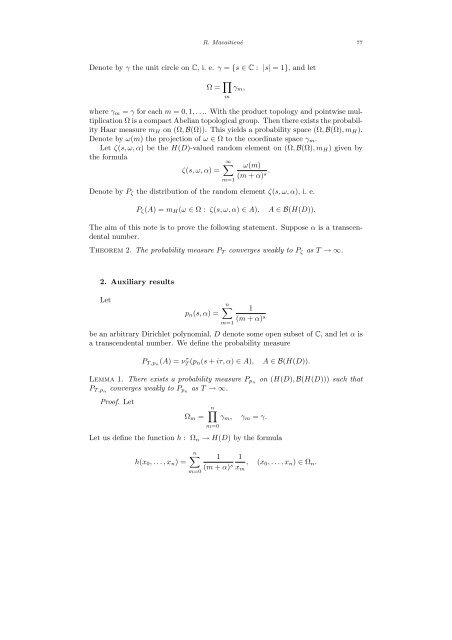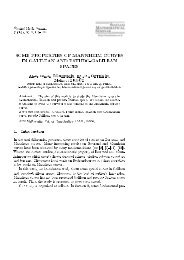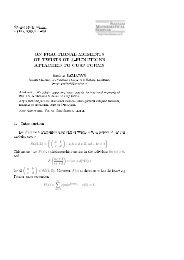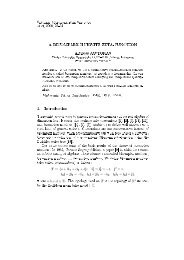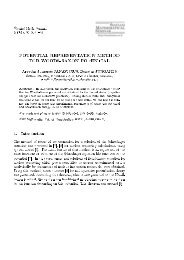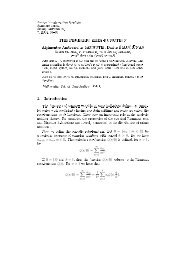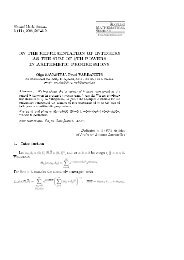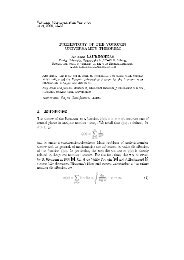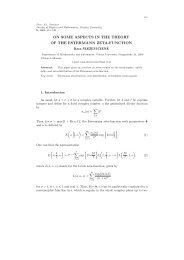a limit theorem for the hurwitz zeta-function in the space of analytic ...
a limit theorem for the hurwitz zeta-function in the space of analytic ...
a limit theorem for the hurwitz zeta-function in the space of analytic ...
You also want an ePaper? Increase the reach of your titles
YUMPU automatically turns print PDFs into web optimized ePapers that Google loves.
R. Macaitienė 77<br />
Denote by γ <strong>the</strong> unit circle on C, i. e. γ = {s ∈ C : |s| = 1}, and let<br />
Ω = ∏ m<br />
γ m ,<br />
where γ m = γ <strong>for</strong> each m = 0, 1, . . .. With <strong>the</strong> product topology and po<strong>in</strong>twise multiplication<br />
Ω is a compact Abelian topological group. Then <strong>the</strong>re exists <strong>the</strong> probability<br />
Haar measure m H on (Ω, B(Ω)). This yields a probability <strong>space</strong> (Ω, B(Ω), m H ).<br />
Denote by ω(m) <strong>the</strong> projection <strong>of</strong> ω ∈ Ω to <strong>the</strong> coord<strong>in</strong>ate <strong>space</strong> γ m .<br />
Let ζ(s, ω, α) be <strong>the</strong> H(D)-valued random element on (Ω, B(Ω), m H ) given by<br />
<strong>the</strong> <strong>for</strong>mula<br />
∞∑ ω(m)<br />
ζ(s, ω, α) =<br />
(m + α) s .<br />
m=1<br />
Denote by P ζ <strong>the</strong> distribution <strong>of</strong> <strong>the</strong> random element ζ(s, ω, α), i. e.<br />
P ζ (A) = m H (ω ∈ Ω : ζ(s, ω, α) ∈ A),<br />
A ∈ B(H(D)).<br />
The aim <strong>of</strong> this note is to prove <strong>the</strong> follow<strong>in</strong>g statement. Suppose α is a transcendental<br />
number.<br />
Theorem 2. The probability measure P T converges weakly to P ζ as T → ∞.<br />
2. Auxiliary results<br />
Let<br />
p n (s, α) =<br />
n∑<br />
m=1<br />
1<br />
(m + α) s<br />
be an arbitrary Dirichlet polynomial, D denote some open subset <strong>of</strong> C, and let α is<br />
a transcendental number. We def<strong>in</strong>e <strong>the</strong> probability measure<br />
P T,pn (A) = ν τ T (p n (s + iτ, α) ∈ A),<br />
A ∈ B(H(D)).<br />
Lemma 1. There exists a probability measure P pn on (H(D), B(H(D))) such that<br />
P T,pn converges weakly to P pn as T → ∞.<br />
Pro<strong>of</strong>. Let<br />
Ω m =<br />
n∏<br />
γ m , γ m = γ.<br />
m=0<br />
Let us def<strong>in</strong>e <strong>the</strong> <strong>function</strong> h : Ω n → H(D) by <strong>the</strong> <strong>for</strong>mula<br />
h(x 0 , . . . , x n ) =<br />
n∑<br />
m=0<br />
1<br />
(m + α) s 1<br />
x m<br />
, (x 0 , . . . , x n ) ∈ Ω n .


